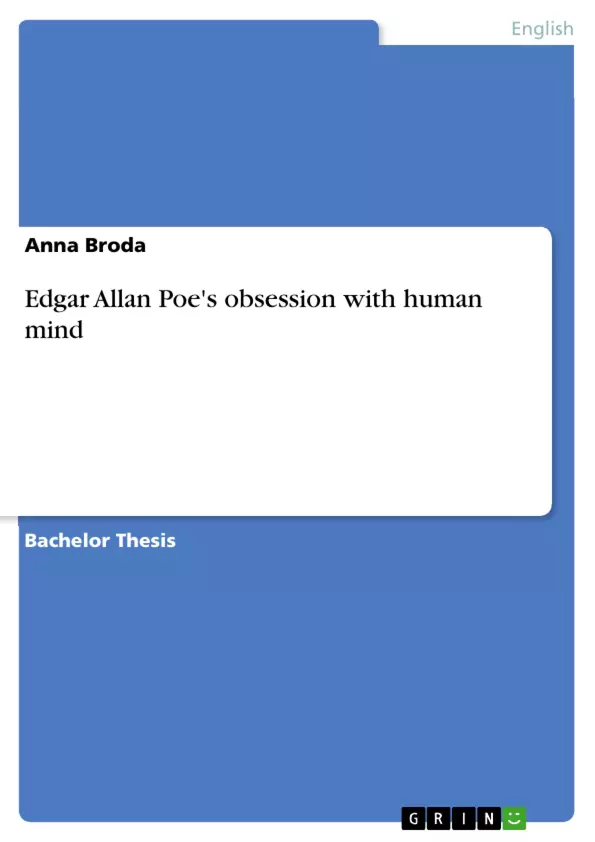The aim of the present study is to analyse Edgar Allan Poe’s selected short stories paying special attention to the author’s fascination with human mind and its morbid states.
The introduction presents the contrast between the American author and his contemporary writers. The differences between Poe and other representatives of Romanticism are discussed. The reader is acquainted with various opinions about Edgar Allan Poe and his literary output. The author of the study discusses Poe’s personality, his lifestyle as well as his literary works, and provides the explanation why the figure of the writer aroused so much controversy among his contemporaries.
The first charter describes the impact of Poe’s life experiences and his personal interests on his literature. The aim of the second chapter is to portray the American author’s fascination with human personality, mental disorders and analytical power of human mind. The last chapter investigates the two outstanding short stories by E. A. Poe – “The Tell-Tale Heart” and “The Black Cat.” The author of the study concentrates on the motifs of madness, death wish and the disintegration of human personality in the stories in question.
The last part of the study discusses Poe’s role in literature as well as the author’s contribution to creating the dark tradition in America.
Table of Contents
- Introduction
- Chapter 1
- Autobiographical Elements in Poe's Works
- Chapter 2
- Poe's Interest in Human Personality In his Writings
- Rational Poe
- Chapter 3
- "The Black Cat" and "The Tell-Tale Heart"
- Conclusions
Objectives and Key Themes
This work aims to explore the complexities of Edgar Allan Poe's personality and the underlying themes in his writings. It seeks to unravel the contradiction between his image as a dreamy fantasist and a cerebral logician. Furthermore, the text analyzes the influence of Poe's life experiences on his works, examining how his internal conflicts are reflected in his writings.
- The dualistic nature of Poe's personality
- The role of autobiography in Poe's works
- Poe's fascination with the human mind and personality
- The influence of Poe's life experiences on his writings
- The contrasting reception of Poe's works in America and France
Chapter Summaries
- The Introduction delves into the complex and often contradictory nature of Edgar Allan Poe's personality and his work. It explores the conflicting perceptions of Poe, both as a misunderstood genius and a troubled individual. The chapter highlights the contrasting reception of Poe's work in America and France, with the French Symbolists embracing his dark and macabre style while many American critics were skeptical of his genius.
- Chapter 1 examines the autobiographical elements present in Poe's writings, exploring how his personal struggles and experiences influenced his creative output. It discusses how his themes of obsession, loss, and despair are often rooted in his own life, highlighting the intricate connection between Poe's internal world and his artistic expression.
- Chapter 2 focuses on Poe's fascination with the human mind and personality. It explores how he delved into the depths of human psychology in his works, analyzing the complexities of human emotions and motivations. The chapter examines how Poe's exploration of the darker aspects of the human psyche, including madness and obsession, continues to resonate with readers today.
Keywords
Key concepts explored in this text include Edgar Allan Poe, American literature, French Symbolism, human personality, obsession, dark romanticism, psychology, literary criticism, biographical analysis, "The Black Cat," "The Tell-Tale Heart," "The Raven," "Ligeia," "Berenice," and "Morella." These keywords represent the core themes and subjects investigated in this comprehensive analysis of Edgar Allan Poe's works and his complex persona.
Frequently Asked Questions
What was Edgar Allan Poe's obsession in his literature?
Poe was fascinated by the human mind, particularly its morbid states, mental disorders, and the analytical power of human reasoning.
Which short stories are analyzed for themes of madness?
The study focuses on "The Tell-Tale Heart" and "The Black Cat," analyzing motifs of madness, death wishes, and the disintegration of personality.
How did Poe's life influence his writing?
Many of his works contain autobiographical elements. His personal struggles with loss, obsession, and despair are deeply reflected in his dark romantic style.
Why was Poe more appreciated in France than in America during his time?
While American critics were often skeptical of his troubled persona, French Symbolists embraced his dark, macabre style and recognized him as a misunderstood genius.
What is the "dualistic nature" of Poe's personality?
It refers to the contradiction between Poe as a dreamy, imaginative fantasist and Poe as a cold, cerebral logician (seen in his detective stories).
- Citation du texte
- Anna Broda (Auteur), 2006, Edgar Allan Poe's obsession with human mind, Munich, GRIN Verlag, https://www.grin.com/document/86092



